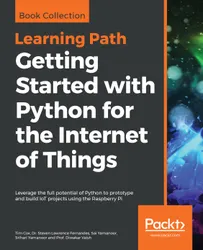A recipe-based guide to programming your Raspberry Pi 3 using Python
Key Features
Leverage the power of Raspberry Pi 3 using Python programming
Create 3D games, build neural network modules, and interface with your own circuits
Packed with clear, step-by-step recipes to walk you through the capabilities of Raspberry Pi
Book Description
Raspberry Pi 3 Cookbook for Python Programmers – Third Edition begins by guiding you through setting up Raspberry Pi 3, performing tasks using Python 3.6, and introducing the first steps to interface with electronics. As you work through each chapter, you will build your skills and apply them as you progress. You will learn how to build text classifiers, predict sentiments in words, develop applications using the popular Tkinter library, and create games by controlling graphics on your screen. You will harness the power of a built in graphics processor using Pi3D to generate your own high-quality 3D graphics and environments.
You will understand how to connect Raspberry Pi’s hardware pins directly to control electronics, from switching on LEDs and responding to push buttons to driving motors and servos. Get to grips with monitoring sensors to gather real-life data, using it to control other devices, and viewing the results over the internet. You will apply what you have learned by creating your own Pi-Rover or Pi-Hexipod robots. You will also learn about sentiment analysis, face recognition techniques, and building neural network modules for optical character recognition.
Finally, you will learn to build movie recommendations system on Raspberry Pi 3.
What you will learn
Learn to set up and run Raspberry Pi 3
Build text classifiers and perform automation using Python
Predict sentiments in words and create games and graphics
Detect edges and contours in images
Build human face detection and recognition system
Use Python to drive hardware
Sense and display real-world data
Build a neural network module for optical character recognition
Build movie recommendations system
Who this book is for
This book is for anyone who wants to master the skills of Python programming using Raspberry Pi 3. Prior knowledge of Python will be an added advantage.
Tim Cox lives in England with his wife and two young daughters and works as a software engineer. His passion for programming stems from a Sinclair Spectrum that sparked his interest in computers and electronics. At university, he earned a BEng in Electronics and Electrical Engineering, and into a career in developing embedded software for a range of industries. Supporting the vision behind the Raspberry Pi, to encourage a new generation of engineers, Tim co-founded the MagPi magazine (the official magazine for the Raspberry Pi) and produces electronic kits through his site PiHardware. Dr. Steven Lawrence Fernandes has Postdoctoral Research experience working in the area of Deep Learning at The University of Alabama at Birmingham, USA. He has received the prestigious US award from Society for Design and Process Science for his outstanding service contributions in 2017 and Young Scientist Award by Vision Group on Science and Technology in 2014. He has also received Research Grant from The Institution of Engineers. He has completed his B.E (Electronics and Communication Engineering) and M.Tech (Microelectronics) and Ph.D. (Computer Vision and Machine Learning). His Ph.D work Match Composite Sketch with Drone Images has received patent notification (Patent Application Number: 2983/CHE/2015).

